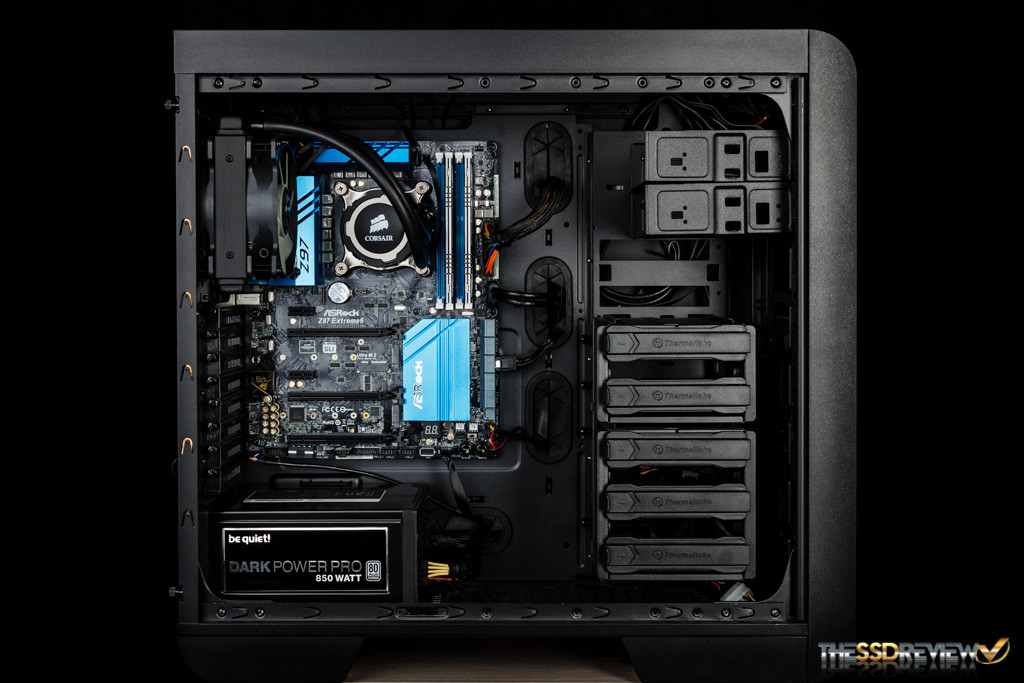TSSDR TEST BENCH AND PROTOCOL
SSD testing at TSSDR differs slightly, depending on whether we are looking at consumer or enterprise SSDs. For consumer SSDs, our goal is to test in a system that has been optimized with our SSD Optimization Guide. To see the best performance possible, the CPU C states have been disabled, C1E support has been disabled, Enhanced Intel SpeedStep Technology (EIST) has been disabled. Benchmarks for consumer testing are also benchmarks with a fresh drive so, not only can we verify that manufacturer specifications are in line but also, so the consumer can replicate our tests to confirm that they have an SSD that is top-notch. We even provide links to most of the benchmarks used in the report.
SYSTEM COMPONENTS
This Test Bench build was the result of some great relationships and purchase; our appreciation goes to those who jumped in specifically to help the cause. Key contributors to this build are our friends at ASRock for the motherboard and CPU and be quiet! for the PSU and cooling fans. Also, a big thank you to Thermaltake for the case and Kingston for the RAM. We have detailed all components in the table below and they are all linked should you wish to make a duplicate of our system as so many seem to do, or check out the price of any single component. As always, we appreciate your support in any purchase through our links!
| PC CHASSIS: | Thermaltake Core V51 |
| MOTHERBOARD: | ASRock Z97 Extreme6 |
| CPU: | Intel Core i5-4670K |
| CPU COOLER: | Corsair H75 |
| POWER SUPPLY: | be quiet! Dark Power Pro 10 850W |
| SYSTEM COOLING: | be quiet! Silent Wings 2 |
| MEMORY: | Kingston HyperX Beast 2400Mhz |
| STORAGE: | Samsung 850 Pro |
| IRST DRIVER: | 13.1.0.1058 |
BENCHMARK SOFTWARE
The software in use for today’s analysis is typical of many of our reviews and consists of Crystal Disk Info, TRIMcheck, ATTO Disk Benchmark, Crystal Disk Mark, AS SSD, Anvil’s Storage Utilities, PCMark Vantage, and PCMark 8. We prefer to test with easily accessible software that the consumer can obtain, and in many cases, we even provide links. Our selection of software allows each to build on the last and to provide validation to results already obtained.
Crystal Disk Info is a great tool for displaying the characteristics and health of storage devices. It displays everything from temperatures, to the number of hours the device has been powered, and even to the extent of informing you of the firmware of the device.
Crystal Disk Info reveals SMART, TRIM, and NCQ support. The firmware revision we are testing on today is 0C3FD6SD. There is a working temperature sensor. Other than that we can see there is an abundance of SMART attributes to monitor and diagnose with.
We’ve covered TRIMcheck in the past. It is a great tool that easily lets us see if TRIM is actually functioning on a SSD volume in your system.

As can be seen in the screenshot above, TRIM is indeed working.
ATTO Disk Benchmark is perhaps one of the oldest benchmarks going and is definitely the main staple for manufacturer performance specifications. ATTO uses RAW or compressible data and, for our benchmarks, we use a set length of 256mb and test both the read and write performance of various transfer sizes ranging from 0.5 to 8192kb. Manufacturers prefer this method of testing as it deals with raw (compressible) data rather than random (includes incompressible data) which, although more realistic, results in lower performance results.
ATTO reveals very solid results with sequential speeds of 564MB/s read and 534MB/s write. All reads are faster than writes and we see very strong small file size performance and a rapid increase in speed as the file size gets larger.
 The SSD Review The Worlds Dedicated SSD Education and Review Resource |
The SSD Review The Worlds Dedicated SSD Education and Review Resource | 

Hi Sean.
Looking at HD Tune fast cache-seems to be about 36 GB.
30 GB file copy should have screamed along at 450+.
Perhaps drive hadn’t had enough time to clear/clean up cache???????????
Know smaller drives with 8 to 12 GB cache tend to really suffer…………….
“Because of this, Kingston has always had products to fulfill this market segment under their SSDNow series…”
Phrased another way, Kingston always strives to win the race to the bottom with their SSDNow series.
Thanks for the review.
Maybe it´s OK for a notebook, for my PC I need a bit more MB/s if writing big data